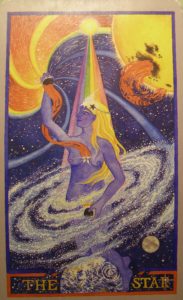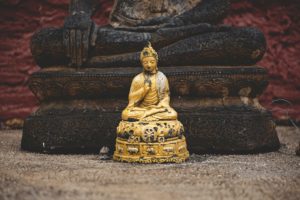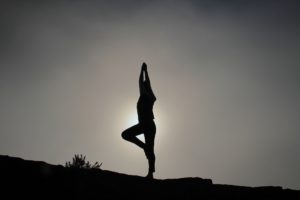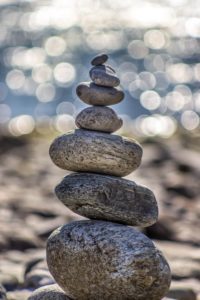by Jenny Rose | Mar 1, 2018 | A Flourishing Woman, Creativity
Alchemy: A seemingly magical process of transformation, creation, or combination (online Oxford Dictionaries).

The Star
Emotional intelligence training opened my eyes to the power of needs in our human experience. Coming to terms with my own needs catapulted me into a new life. During the months in which I learned to navigate through my feelings, needs (click here for needs inventories), limiting beliefs and stories, I kept coming back around to the same question.
If I accept that all human beings have needs, and a right to have them met, what then do I do with my unmet needs, past and present?
We might all have a right to get our needs met, but that doesn’t mean we have a guarantee they will be met, or that we can hold anyone responsible for meeting them. We can meet some of our own needs, but not every one. Some needs require healthy connections with others, but not everyone has that. Some people don’t have a single healthy connection with another human being, let alone many, and one relationship can’t meet all our needs.
Unmet needs are devastating, make no mistake. They drive addiction, all kinds of violence and power-over behavior (like school shootings), mental and physical disease and illness, and suicide. A chronically unmet need is a nonhealing, stinking ulcer on the soul. We may hide it from others and even ourselves, but it never stops oozing blood and pus. Unmet needs can cripple and/or kill us. We can let go of some people, behavior and beliefs, but needs are intrinsic.
None of us can entirely meet another’s needs. We all have limitations of some kind, and finite resources of time and energy. Being unable to meet another’s needs is not necessarily because we’re unloving or uncaring. Most of our close relationships probably do meet some of our needs some of the time, and we meet some of their needs some of the time. It’s not black or white. It’s a continuum, a balance of reciprocity.
So, I ask again, what about our needs that just don’t get met because even our healthy connections are unable to fill them?
At that point we make choices. We can choose to:
- Act out in some desperate, destructive or deadly way that hurts ourselves or others.
- Blame the people around us for failing to meet our needs.
- Blame ourselves for having needs and feeling the pain of having them unmet.
- Deny that we need anything from anyone — ever (my personal favorite).
- Figure out how to neutralize the experience of unmet needs.
By neutralize, I mean accept and surrender to how painful it is to carry around a bone-deep, persistent longing for something that’s unavailable.
Acting out has never been my style. I’m also not much interested in blaming others for what goes wrong in my life. It feels like a cop-out and it disempowers me. Blaming myself — now that I’m very good at. I’ve spent years perfecting the art of self-loathing, but it’s never been helpful. Not even one time. Besides that, it hurts. I can’t pull off denial, at least not for long. I might refuse to admit certain things to someone else, but I don’t play games like that in the privacy of my own head. I have a file in my documents labeled ‘Denial File.’ Now and then I put something in that file and leave it there while I wrestle with my unwillingness to believe. When I’m ready to stop arguing with what is, I take it out and re-file it. Usually, the Denial File is empty, but I like knowing it’s there for the really tough information.
That brings me to the last choice, which leaves me standing squarely in my power. I don’t hurt myself, I don’t hurt anyone else and I get to think outside of the box — my favorite thing! What kind of alchemy transforms, creates or combines an unmet need into something beautiful?
For several months I’ve been researching outer space for my second book. I’ve compiled lists of constellations and the mythology around them. I have definitions of meteors, comets and nebulae. I’ve spent hours looking at images from space. Astounding, mysterious, vast and lovely, the universe is infinitely larger than the largest playing field I can imagine. I gulp down science fiction books and I’ve watched hours and days and weeks of Star Trek, Stargate, Battlestar Galactica, Firefly and yes, yes, Star Wars!
I also, fairly frequently, turn up The Star card when I work with my Tarot deck. The Star symbolizes creative powers, confidence and diversity.
So, what if I create a cosmos? Great word, cosmos. It means “the universe seen as a well-ordered whole” (online Oxford Dictionaries). I’m always in favor of well-ordered, especially when I get to define it. All the pieces of my experience, including unmet needs, are part of a whole. I prefer combination and integration to amputation.

Photo by NASA on Unsplash
Here I am, with my unmet needs, my history, the people who have been significant in my life and a lot of passionate feelings to express and process. I’m an alchemist, a creator, and before me is a vast black nothingness.
I want stars in my cosmos, so every tear I’ve ever cried becomes a star. I fling them far and wide, like handfuls of tiny crystals. My cosmos is so vast there’s always room for more.
I want planets in my cosmos. I hang them carefully, one by one. These are the people in my life, past and present, living and dead. Some are hot planets, sere and lifeless. Others are cool and green and blue. Every cosmos needs a bloviating, bullying gas giant with heavy gravity that sucks more than its fair share of, well, everything! Rings are decorative, and spots and alien seas and strangely-shaped continents. Also, sand dunes and storms, poisonous (to us) gases, radiation, erupting volcanoes, mountain ranges and glaciers.

Photo by NASA on Unsplash
How about moons? Cool and sterile or lush and verdant; I definitely want moons. I want constellations, too, and stories to go with them. Blazing meteors and trailing comets add movement. Nebulae add color and mystery. Galaxies swirl and spiral or spill like ribbons of milk against the darkness. Black holes suck. Suns supernova.
One by one, I use my unmet needs to decorate my cosmos. I turn them into color, texture, pattern, alien world, moon, star, sun, comet, meteor and nebula. I name them, animate them with feeling, polish them like jewels and set them in place. Maybe they stay in the farthest reaches of my cosmos, where I rarely visit them, or maybe I keep them closer. Perhaps my unmet needs appear from time to time in a meteor shower or a comet with a long tail, and I marvel at their beauty and mystery and remember again their taste and feel before they burn away to ash or disappear behind a planet.

Photo by Bryan Goff on Unsplash
My cosmos is my laboratory and my kitchen, illuminated by starlight. I stir and simmer over the heat of suns; chop and mix under waxing and waning moons; grind alien insects, rocks and roots for pigment and infuse gas and cosmic dust with color. I orbit, I dance from galaxy to galaxy in bare feet, combine a pinch of this with a handful of that until I float, weightless and free, in a cosmos of my own design and decoration.
Whenever the world is too much with me and I find myself staggering under burdens of unmet needs and other things I cannot release, I unlock a hidden door with the key I carry between my breasts and find star candles lit, suns asimmer, planets revolving and black holes lurking. Mortar and pestle, cauldron and crucible wait for my magical offerings as I combine, create and transform the material of my life into a complex and resplendent whole.
Alchemy. My daily crime.

Photo by Bryan Goff on Unsplash
All content on this site ©2018
Jennifer Rose
except where otherwise noted
by Jenny Rose | Jan 11, 2018 | Connection & Community, Emotional Intelligence
In life coaching, I was introduced to the idea that human beings have three primary needs: Connection, contribution and authenticity. I have yet to discover a need that doesn’t fall into one of these categories, so at this point it’s still a frame that works for me.

Photo by Peter Hershey on Unsplash
For me, any discussion of connection must include spiritual connection, and to talk about that clearly I need to define terms.
Spirit: The nonphysical part of a person that is the seat of emotions and character; the soul.
Religion: The belief in and worship of a superhuman controlling power, especially a personal God or gods.
Faith: Strong belief in God or in the doctrines of a religion, based on spiritual apprehension rather than proof.
Ideology: The ideas and manner of thinking characteristic of a group, social class, or individual.
Sacred: Connected with God (or the gods) or dedicated to a religious purpose and so deserving veneration.
(All definitions from Bing search.)
Spirituality: Spirituality may refer to almost any kind of meaningful activity, especially a “search for the sacred.” It may also refer to personal growth, blissful experience, or an encounter with one’s own “inner dimension.” (Wikipedia)
The archeological record tells us we have sought to understand ourselves as part of a greater whole from the infancy of mankind. Long before written records were made, there was cave art, pottery and carving thought to represent sacred beings, including, in many cases, animals. When we began to write, myth, story and legend wove a rich tapestry of religion and other spiritual frameworks all over the world.
Our powerful need for spiritual connection has historically been a significant motivator geopolitically, economically and creatively. Our search for understanding who we are and what our place in life is, individually, culturally, politically and socially, firmly anchored in our conception of spirit.
How do we create a spiritual connection? How do we choose from such a bewildering array of beliefs and ideologies? How do we cope with tribal shaming if we don’t accept the spiritual beliefs of our family or tribe? How do we think about the “nonphysical part” of ourselves, and what, if anything, does that part of us need?
It’s taken me more than 50 years to even begin to answer these questions. The two biggest obstacles I had to overcome were disconnection from my own feelings, and denying having any needs. Disconnection and denial are both disempowering, and healthy spiritual practice, at its heart, is a practice of self-empowerment.
Some people approach formal, organized religion as a way to share power. Others are quick to use it to assure power over others, and at that point it no longer fits my definition of a healthy spiritual practice. Discovering and nurturing the shape of our own spirit is an act of dignity, privacy and self-respect. It has nothing to do with what anyone else thinks or believes. We decide where we stand on the continuum between science and faith, and we define what is sacred in our lives. We have the power, and we have the responsibility. No mystic, guru, psychic, yogi, mentor, sponsor or other spiritual or religious leader or authority knows what we need better than we do. We owe nobody an explanation, justification or apology for our spiritual practice, as long as that practice doesn’t seek to harm or control others.
That’s not to say the guidance, teachings and wisdom of scholars, practitioners, philosophers, masters and thinkers are without value or interest. Yoga, martial arts, meditation, mandalas, drumming, dance, sacred traditional music and countless other rituals and traditions may be part of a spiritual practice, but none of these are essential. The real strength of spiritual practice doesn’t lie in appearance, embellishments, publicity or visibility and has nothing to do with economic or social condition.
A spiritual practice is an activity in which we are wholly present with ourselves in a nonjudgmental fashion and after which we feel empowered, anchored, refreshed and renewed. A healthy spiritual practice is a haven, a refuge, a place of solace and joy. It connects us to ourselves, to others, and to something larger than we are. It doesn’t matter if we name that something God, Allah, Spirit, Divine, Goddess or even Gaia, it all boils down to the basic human need for some kind of spiritual connection.
A few weeks ago I wrote about living a seamless life. My spiritual practices are frequently invisibly embedded throughout my every day life, requiring nothing more than my presence and intention.
Here’s an example: After a long day the kitchen is full of dirty dishes. I slather my hands with the most luxurious lotion/cream in the house and don rubber gloves. I turn off lights, tech and the TV. I light a couple of candles. I might play some music, or just soak up silence. I look out the window over the sink. I breathe. I relax. I’m present. I’m consciously grateful for a kitchen, dishes, a sink, running hot water, the ability to stand and use my hands, and food that creates dirty dishes. I take time to feel what I feel, check in with myself, daydream and drift.
I approach exercise as a spiritual practice. I’m not worried about my weight or health, but I do notice I feel better, sleep better and function better if I stay active, so my daily goal is to show up at some point with myself to move. Sometimes I dance. Once a week I swim, then soak in a therapy pool, then take a long hot shower. I walk, both by myself and with my partner. This winter I’m going to begin snowshoeing. I do Tai Chi. With the exception of walking with my partner, all of these activities are opportunities to have time with myself, quiet, undistracted time in which to be in my body, remember what a beautiful world I live in, practice gratitude, allow feelings, pray, chant, sing, work creatively, stretch and breathe. When I’m finished I feel relaxed, empowered, centered and grounded.

Photo by Miranda Wipperfurth on Unsplash
A spiritual practice may be as simple as a special tree, rock, crystal, cushion and/or candle. It might be a secret altar or shrine, a string of beads or a stick of incense. It can take place anytime, anywhere, solo or in a group. It can be a five-minute pause or a long weekend of ritual at a hot spring, but it always makes us bigger. Anything that diminishes, restricts, confines, limits, shames, invalidates or disempowers us is not a healthy spiritual practice, no matter what anyone says. It’s merely an ideology of control.
Many of us naturally find our way into spiritual practice without realizing what we’re doing, impelled by this often unconscious but powerful human need. Recognizing the need for spiritual connection, giving it language, honoring and allowing it, allows us to take back our power to define and protect sacred space in our lives, free from distraction, interruption, multitasking, pressure, hurry and the constant noisy static of media and entertainment. If our spiritual life is tainted by criticism and judgement, our own or others’, it won’t sustain us and our spirit will sicken and starve. We’ll begin to look outside ourselves for spiritual nourishment and become vulnerable to addiction, perfectionism, pleasing others and people who steal power.
The care and feeding of the spirit is the least talked about aspect of the need for connection, but it may be the most important. In the absence of spiritual connection, all our other connections suffer. True spiritual power transcends physical strength, youth and beauty, and it cannot be coerced or stolen. Our greatest strength may lie in our ability to create spiritual connection for ourselves and support others in theirs.

Photo by Deniz Altindas on Unsplash
All content on this site ©2018
Jennifer Rose
except where otherwise noted
by Jenny Rose | Dec 14, 2017 | Authenticity, Emotional Intelligence, Needs
It occurred to me this morning that, in general, I’m still confused about what I want.
I’ve had a tumultuous history with my own wants. At some point, very early, as I was learning to be a people pleaser, I gave up wanting anything because I thought it was bad. What I understood was that everyone else’s wants were far more important, and it was my more-than-full-time job to provide those wants rather than selfishly have my own. With rare exceptions, that’s been my modus operandi my whole life.
When I went through a life coaching and emotional intelligence program, my coach suggested I had a perfect right to get my needs met, and he defined some of my “wants” as needs, for example my longing for community and connection. I was enraged. Nobody had ever before made such an outrageous proposal. He clearly didn’t understand the terrible vulnerability of needing or wanting anything from anyone. Having the right to get needs and wants met was the most ludicrous, dangerous piece of heresy I’d ever heard.
That was four years ago, and I’m as angry about it now as I was the first time I heard it.
I also can’t leave the idea alone. I think about it all the time.

Photo by John Salvino on Unsplash
I picture my needs and wants as a snarling chained wolf with blazing eyes, nothing but matted grey hair over bones, backed into a tight corner, determined to go down fighting.
I grieve, literally, to admit I chained it there myself. I chained it without food, water or shelter, and walked away — for decades. During those years of neglect, it starved and thirsted. It suffered alone with no help, no hope, a solitary prisoner.
I’ve done a lot of animal rescue work in my time, and I know sometimes an animal is just too far gone to rehabilitate. Sometimes you can save their bodies, but the abuse and neglect they’ve suffered has damaged their will to live and their ability to trust and connect, and rescue comes too late. Sometimes, against all odds, some strength of heart or spirit survives and an animal accepts affection and care, but its body is too starved or broken to heal.
Part of what I’ve been doing since I’ve come to Maine is to try to rescue my chained wolf, this piece of self I rejected, denied and tried to destroy.
It’s a long process, filled with grief, shame and anger. It takes determination, patience, and the willingness to own my history, my pain and my choices, as well as consenting to my responsibility for my own self-healing. Overcoming internal taboos is desperately hard work, and Wanting is one of my oldest taboos.
Sometime last year I wrote a list titled “Things to Want.” It was short and consisted of necessities, mostly. After a lot of hesitation, I added two things that were not necessary but I just … wanted. It felt wrong. It felt shameful. I left the list on my desk and over the following days and weeks I looked at it as I went about my life. About eight months later I bought one of the unnecessary things, a perfumed body oil I love. It cost about $25.
It was like offering a little bit of bland food to my starving wolf, pushing it near with a stick so as to avoid getting mauled. Not so much food as to make it sick, but a place to start.

Photo by Arun Kuchibhotla on Unsplash
This morning, in the pause of winter and our first big snowstorm, my partner and I talked about our plans, our dreams, and our progress. Later, I went out to walk in the snow and I suddenly saw another layer to wanting, another step closer to making amends to my chained wolf.
Wanting is just the beginning. Making a Christmas list is only the top step. What’s the list under the Christmas list, and the list under that? What is it I really want, independent of anyone else? What about the dreams I hold in common with no one, that are just about and for me? If I was free — If my wolf could bound through the snowy landscape and disappear into the Yule forest — what would I want? If we could escape judgement, our own and others’; escape for a moment our stories and labels and self-definitions; escape family, social and tribal expectations; escape our ideology (most imprisoning of all) and want, honestly, nakedly, with all our hearts, what would that Christmas list look like?
In other words, it’s not about the perfumed body oil (Aphrodisian Fire, by the way, from Kate’s Magik). It’s about touch, scent and caring for my thinning skin. It’s about deliberately honoring my own feminine sensuality.
I don’t need any particular product, cosmetic, clothing, gizmo or piece of technology in order to honor my own feminine sensuality, although there are plenty of things to buy that might support that want, including Aphrodisian Fire, but I see now those are really just symbols. I have the power to honor my sensuality in the way I live — in the choices I make about who I connect with and how, and how I treat myself.

Photo by Caley Dimmock on Unsplash
Santa hasn’t got my choices in his sleigh.
I’m very attached to the dreams my partner and I hold in common. I love our vision, and I’m invested in it. It’s going to take a lot of money, and we don’t have that right now.
Maybe we won’t ever have it.
Maybe I was a damn fool (again) and I should never, never, have listened to someone who says it’s okay to have needs and want them met. Maybe I should walk away from my wolf again, and this time never come back. Let it starve to death.
But maybe our grand vision and plans are only the top layers of what I really want. Maybe the plan is the wrapping paper around the real treasures of self-reliance; living as part of a complex, self-sustaining system; building independence from the energy grid and a culture I largely can’t support; fostering community and trusting in my greatest joy … writing.
I don’t have to wait for the plan to happen to have those things. I don’t need money. I don’t need to wait for someone else. I don’t need to brutally imprison or eliminate my wants and needs. I can be learning, building and transforming my life right now, today, from the inside out. I can, day by day, draw a step closer to my wolf with food, with water, with a gentle hand and with compassion, and maybe, one day, come close enough to remove the chain and let the poor creature go free and wild into the world, wanting and needing as it will.
So, I’m making a list and checking it twice. Or three times. I’m peering underneath the items, things, objects, stuff on that list. What is it I really want? What am I really longing for? And if I look under that, what do I find? What are the deepest wants and needs?
Merry Christmas, everyone.

Photo by Galina N on Unsplash
All content on this site ©2017
Jennifer Rose
except where otherwise noted
by Jenny Rose | Oct 26, 2017 | A Flourishing Woman, Mind
I went to the dentist last week. I spent the usual hour with the hygienist and then the dentist breezed in to give me four or five minutes of exam, comment, teaching and friendly conversation. Thankfully, I don’t require more than this, as my teeth are in excellent shape. In the course of those few minutes, I used the term “permaculture,” and he asked me what it was. I gave him a brief answer, and on the way out the hygienist said I had a “high dental IQ.”
“She has a high IQ, period,” he responded as he left.
I almost got out of the chair and went after him to explain that I’m the dumb one in the family, and certainly don’t have a high IQ.
As I’ve gone about life since then, I’ve thought a lot about that interaction. I’ve also been feeling massively irritated, isolated and discouraged. This morning I woke out of a dream of being in a closet groping for my gun, my knife, even my Leatherman, absolutely incandescent with rage, because a man outside of the closet was having a dramatic and violent meltdown, intimidating everyone present because of something I’d said or done that he didn’t like.
I wasn’t intimidated. I was royally pissed off.
When I had my weapons assembled, I stormed out of the closet and came face-to-face with a clearly frightened woman who was wringing her hands and making excuses for the behavior of the yelling man. I screamed into her face that he could take his (blanking) opinions and shove them up his (blanking blank) and unsheathed my knife, not because of her, because of HIM.
I woke abruptly at that point and thought, I’m not depressed, I’m MAD!

Photo by Nicole Mason on Unsplash
While I showered and cooked breakfast I sifted through IQ and conformity and cultural and family rules, economic success and failure, work, invalidation and silencing and keeping myself small. I thought of how pressured I’ve always felt to toe the line, be blindly obedient, follow the rules, ask no questions and be normal. Normal, as in compliant, and refraining from challenging the multitude of life’s standard operating procedures that “everyone knows.” Normal, as in not daring to resist, persist, poke, peel away, uncover. Normal, as in never, NEVER expressing curiosity, a thought, an experience, a feeling or an opinion that might make someone uncomfortable. Normal, as in never admitting that the way we’re supposed to do things doesn’t always work for me, and frequently doesn’t appear to work for others, either. I slammed around the kitchen, turning all this over in my mind, letting the bacon burn, and finally pounced on a keystone piece to write about.
What does it mean to be smart? Why do I feel like a lying imposter when someone makes a casual comment about my IQ? Why is IQ even a thing? Why does so much of my experience consist of “sit down and shut up!”?
Intelligence is defined on an Internet search as “the ability to acquire and apply knowledge and skills.” Please note the absence of any kind of test score in that definition. Likewise, there’s no mention of economic status, educational status or social status. Also, this definition says nothing about intelligence as a prerequisite for being a decent human being.
The definition takes me back to the playing field in which I wrote last week’s post on work. Here again we have a simple definition for a word which is positively staggering under assumptions and connotations.
Fine, then. I’ve explored what work means to me. What does intelligence mean to me?
Intelligence means the ability to learn, unlearn and relearn. Good learners do not sit down and shut up. We question, and we go on questioning until we’re satisfied with answers. We try things, make hideous mistakes, think about what went wrong and apply what we learned. We don’t do the same thing over and over and expect a different result. We exercise curiosity and imagination. We pay attention to what others say and do and how it all works out. We pay attention to how we feel and practice telling ourselves the truth about our experience. After a lot of years and scar tissue, we learn to doubt not only our own assertions, beliefs and stories, but everyone else’s as well. We practice being wrong. We become experts in flexible thinking. We adapt to new information.
We give up arguing with what is.
Intelligence endures criticism, judgement, abuse, taunts, threats, denial and contempt. It’s often punished, invalidated and invisible. Intelligence takes courage.

Photo by Cristina Gottardi on Unsplash
Intelligence is power. It does not sit at the feet of any person, ideology, rule or authority and blindly worship. It retains the right to find out for itself, feel and express its own experience, define its own success, speak its truth in its own unique voice, and it remembers each of us is limited to one and only one viewpoint in a world of billions of other people.
Intelligence is discerning the difference between the smell of my own shit and someone else’s.
For me, intelligence is a daily practice. It’s messy and disordered and fraught with feeling. It means everything is an opportunity to learn something new. Everything is something to explore in my writing.
I have no idea what my IQ is, and I don’t much care. I’m sick and tired of all the family baggage I’ve carried around about who’s smart and who isn’t and how we all compare. Honestly. What am I, 10 years old? Enough, already.
I’m also fed up with being silenced, and in fact I’ve already refused to comply with that, as evidenced by this blog. I understand a lot of people don’t want to deal with uncomfortable questions. Too bad. Those folks are not going to be my readers. It’s not my job to produce sugar-coated bullshit that can’t possibly threaten or disturb anyone.
So there it is. The practice of intelligence.

Photo by frank mckenna on Unsplash
All content on this site ©2017
Jennifer Rose
except where otherwise noted
by Jenny Rose | Aug 24, 2017 | A Flourishing Woman, Self-Love
My partner has trained in Aikido, and he relates hearing the above advice years ago from his teacher. Ever since he repeated it to me, I’ve been turning it over in my mind.
We lately found a Tai Chi teacher and joined a class. I’ve wanted to do Tai Chi for a long time, and it’s every bit as much fun as I always imagined it would be. I practice every day, and part of my practice is meditating on that wonderful piece of subtle Eastern wisdom: Don’t be where the blow lands.

Photo by Jason Blackeye on Unsplash
Tai Chi is a Chinese martial art focusing on energy manipulation, practiced for defense and health. Many of the people in the class we joined are there to address balance and strength. I’m happy to support both my balance and my strength, but I’m learning Tai Chi primarily as a grounding and centering tool.
We’re learning a series of specific slow, repetitive movements that flow into one another. Each movement is called a form, and each form has its own, often poetic name: The bow, the crane, windmills, the lute. Tai Chi emphasizes locating and moving from one’s center, and it’s interesting how difficult I find that.
Learning the forms and stringing them together is no problem for me. It takes a lot of repetition to get arms and legs coordinated and figure out proper positioning, but I like repetition and want to practice. What I notice, though, is how easily I lose my center. I reach or step too far. I find myself up on one toe or another when I’m not supposed to be. I put one foot directly in front of another, like a model on a catwalk, instead of maintaining a more stable, wider-based stance. My ankles are weak and unsteady. If I’m doing one form at a time in isolation, I can tighten my core and be solid, but Tai Chi is flowing movement, albeit slow, and after a few different forms my center is gone.
Losing my balance in this way is a perfect metaphor for the way I’ve lived my life until recently. My energy and attention were always directed outward. I had very little ability to support myself; I relied on external support and I didn’t distinguish toxic inputs from healthy ones. I was too hungry and had too many unmet needs; I took a lot of poisoned bait. Not only did I stand where blows landed and bullets sped, I made a camp there and called it home. I believed I needed those blows and bullets, that they meant love, that it was my responsibility to endure them, and that I deserved them.
We can’t avoid life. Harsh words, verbal attacks, physical violence and unexpected events like fire, flood, riots and sudden public violence are going to happen. Even so, there are ways in which to meet life’s blows with all the grace and elegance of Tai Chi, and as I practice the forms and movements, I think about the skills that allow me to absorb the blow, to flow with it, and to step away from where it landed before it can be repeated.
I’m a big proponent of self-defense and I always carry a knife. I’m not afraid to fight. One day soon I’m going to learn to shoot and buy myself a gun, which I will carry. That kind of self-defense is a separate thing from my practice of Tai Chi. Tai Chi is not about any kind of an aggressor lurking in an alley or a parking lot; it’s about emotional and energetic safety.

Photo by Deniz Altindas on Unsplash
Tai Chi, along with swimming, dancing, ritual work, walking and writing, is a way to call myself home, back to the center, back to my bones and the source of myself. Maintaining my center absolutely requires my undivided presence. I can’t center properly if I refuse to know all of who I am. I can’t maintain balance if I refuse to love all of who I am. The minute I try to amputate bits and pieces of myself, deny my thoughts and feelings or start tearing myself down in any way, I’m standing (again) where blows are guaranteed to land. When I catch myself justifying; pleading; waiting for external validation; trying to please; choice-making out of fear, denial and self-doubt, I know I’m standing on the shooting range with a target pasted over my heart and head.
I’ve spent too much of my life staggering under loads of other people’s shit, carrying vampires and dragging chains. Confusion, fear, perfectionism, disempowerment and constipated unacknowledged feelings have all kept me standing where the blows land. Arguing with what is has cemented me in the path of bullets. Clarity, self-confidence, making friends with my feelings and reclaiming my power allow me to deflect, block or better absorb the blows that come my way.
I’m intentional about living with the wisdom of choosing not to be where the blow lands. Reclaiming my center and moving mindfully from danger, not only physically but creatively and emotionally, all but eliminates my fear and anxiety. Concentrating on grounding leaves no room for anything but strength and rootedness. The meaning of my life is not out there, in the noise and chaos of what others think, say and do. The meaning of my life is in here, centered within the container of my body, expressed by what I think, say and do.

Photo by Amy Humphries on Unsplash
Now, if you’ll excuse me, I have to go see if I can remember the windmills and the lute from yesterday’s class.
All content on this site ©2017
Jennifer Rose
except where otherwise noted

















